Legal and Ethical Issues in Nursing: A Study on Health Law for Nurses
VerifiedAdded on 2021/11/17
|9
|2345
|24
Essay
AI Summary
This essay provides an overview of health law for nurses, focusing on the scope of practice, legal obligations, and ethical principles that govern their professional conduct. It discusses the boundaries within which registered nurses are allowed to practice, emphasizing their duties and responsibilities in providing care, promoting health, and advocating for patients. The essay also examines the impact of legislation, such as the Work Health and Safety Act of 2011 and the Health Records and Information Privacy Act of 2002, on nursing practice, highlighting the importance of maintaining patient confidentiality and ensuring a safe working environment. Furthermore, it addresses the responsibilities of nurses in reporting unsafe or unprofessional practice, referencing the Health Practitioner Regulation National Law and the standards set by the Nurses and Midwifery Board of Australia. The essay concludes by underscoring the ethical principles that guide patient care, including confidentiality, beneficence, justice, and non-maleficence, and emphasizes the importance of upholding these principles to protect patients from harm.
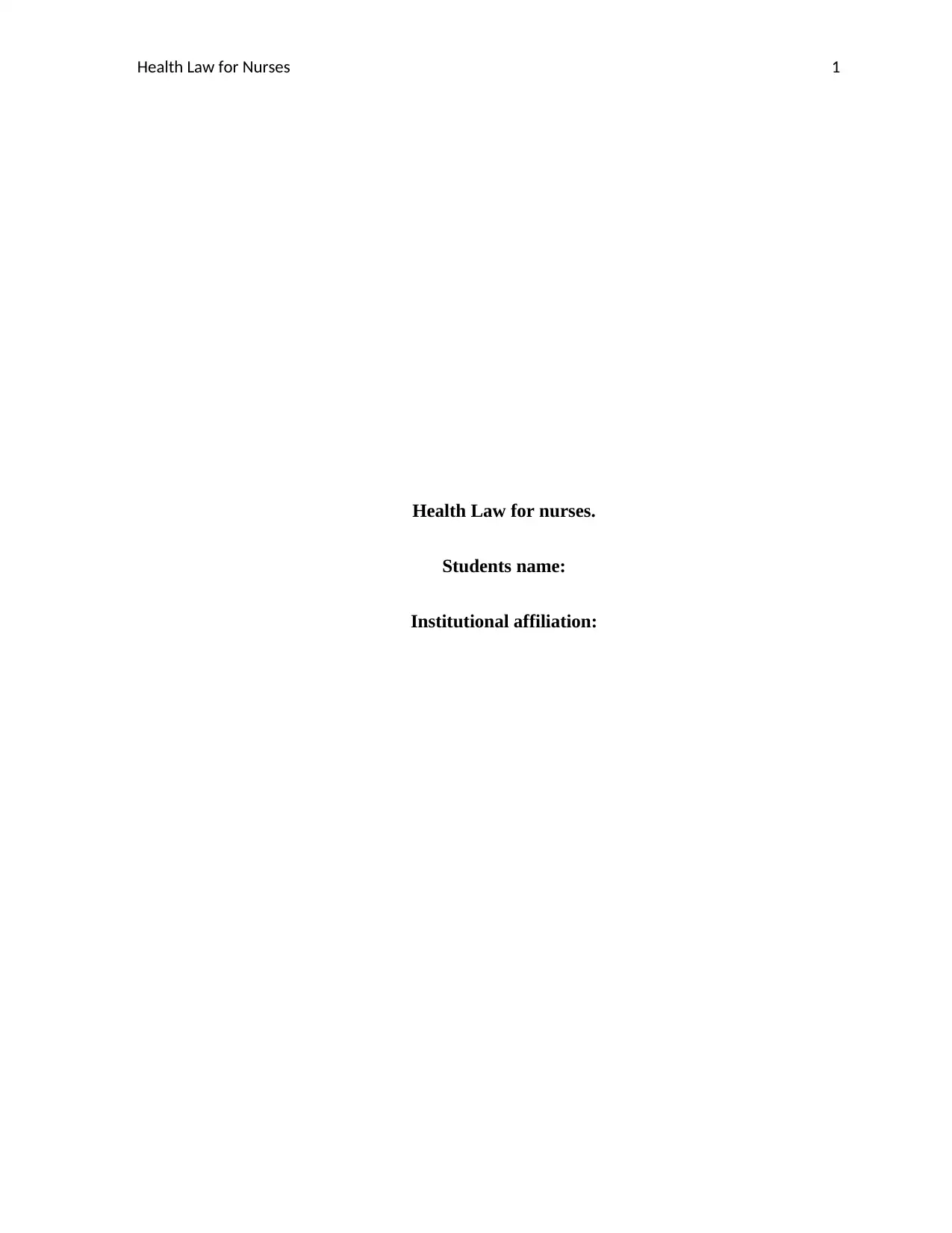
Health Law for Nurses 1
Health Law for nurses.
Students name:
Institutional affiliation:
Health Law for nurses.
Students name:
Institutional affiliation:
Paraphrase This Document
Need a fresh take? Get an instant paraphrase of this document with our AI Paraphraser
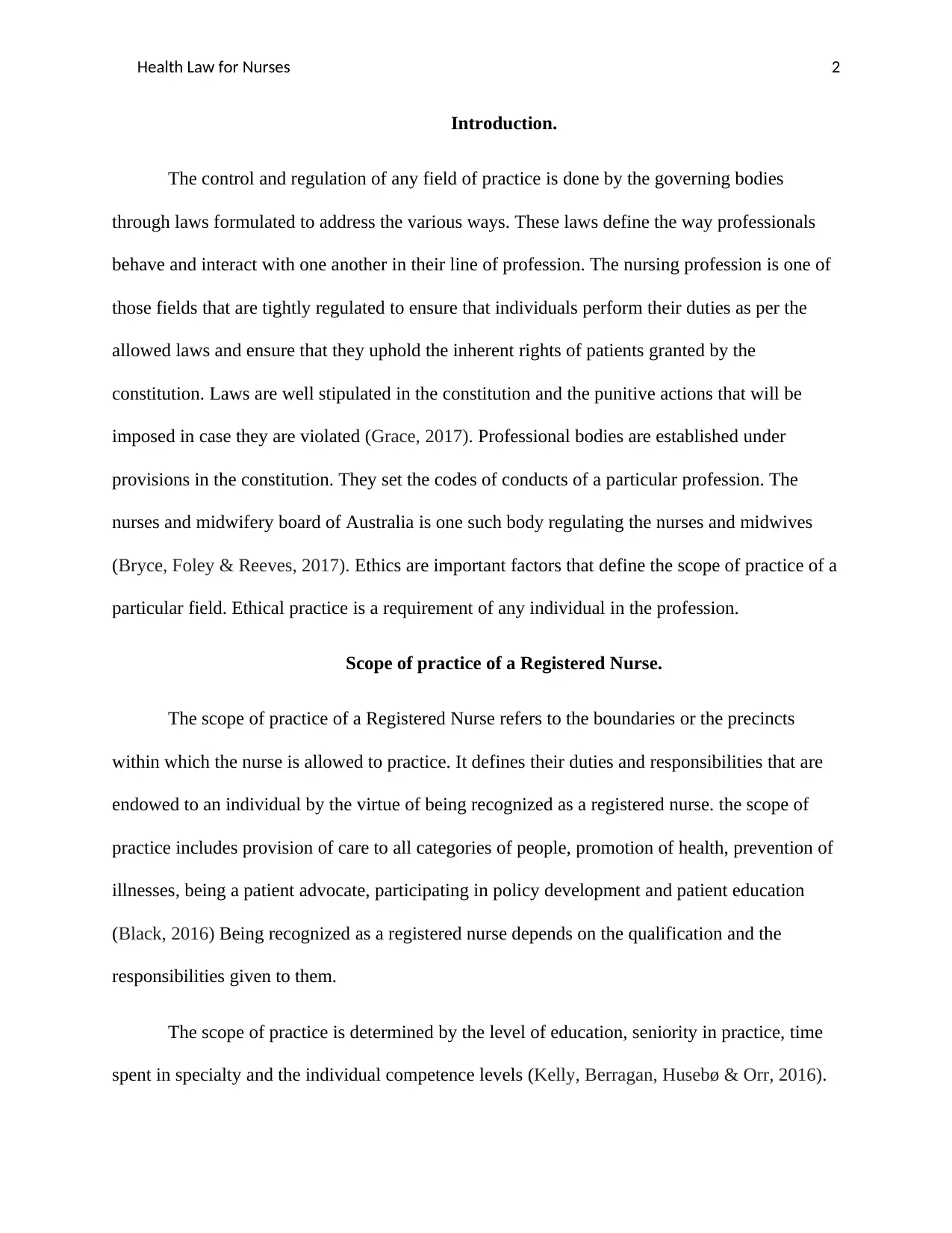
Health Law for Nurses 2
Introduction.
The control and regulation of any field of practice is done by the governing bodies
through laws formulated to address the various ways. These laws define the way professionals
behave and interact with one another in their line of profession. The nursing profession is one of
those fields that are tightly regulated to ensure that individuals perform their duties as per the
allowed laws and ensure that they uphold the inherent rights of patients granted by the
constitution. Laws are well stipulated in the constitution and the punitive actions that will be
imposed in case they are violated (Grace, 2017). Professional bodies are established under
provisions in the constitution. They set the codes of conducts of a particular profession. The
nurses and midwifery board of Australia is one such body regulating the nurses and midwives
(Bryce, Foley & Reeves, 2017). Ethics are important factors that define the scope of practice of a
particular field. Ethical practice is a requirement of any individual in the profession.
Scope of practice of a Registered Nurse.
The scope of practice of a Registered Nurse refers to the boundaries or the precincts
within which the nurse is allowed to practice. It defines their duties and responsibilities that are
endowed to an individual by the virtue of being recognized as a registered nurse. the scope of
practice includes provision of care to all categories of people, promotion of health, prevention of
illnesses, being a patient advocate, participating in policy development and patient education
(Black, 2016) Being recognized as a registered nurse depends on the qualification and the
responsibilities given to them.
The scope of practice is determined by the level of education, seniority in practice, time
spent in specialty and the individual competence levels (Kelly, Berragan, Husebø & Orr, 2016).
Introduction.
The control and regulation of any field of practice is done by the governing bodies
through laws formulated to address the various ways. These laws define the way professionals
behave and interact with one another in their line of profession. The nursing profession is one of
those fields that are tightly regulated to ensure that individuals perform their duties as per the
allowed laws and ensure that they uphold the inherent rights of patients granted by the
constitution. Laws are well stipulated in the constitution and the punitive actions that will be
imposed in case they are violated (Grace, 2017). Professional bodies are established under
provisions in the constitution. They set the codes of conducts of a particular profession. The
nurses and midwifery board of Australia is one such body regulating the nurses and midwives
(Bryce, Foley & Reeves, 2017). Ethics are important factors that define the scope of practice of a
particular field. Ethical practice is a requirement of any individual in the profession.
Scope of practice of a Registered Nurse.
The scope of practice of a Registered Nurse refers to the boundaries or the precincts
within which the nurse is allowed to practice. It defines their duties and responsibilities that are
endowed to an individual by the virtue of being recognized as a registered nurse. the scope of
practice includes provision of care to all categories of people, promotion of health, prevention of
illnesses, being a patient advocate, participating in policy development and patient education
(Black, 2016) Being recognized as a registered nurse depends on the qualification and the
responsibilities given to them.
The scope of practice is determined by the level of education, seniority in practice, time
spent in specialty and the individual competence levels (Kelly, Berragan, Husebø & Orr, 2016).
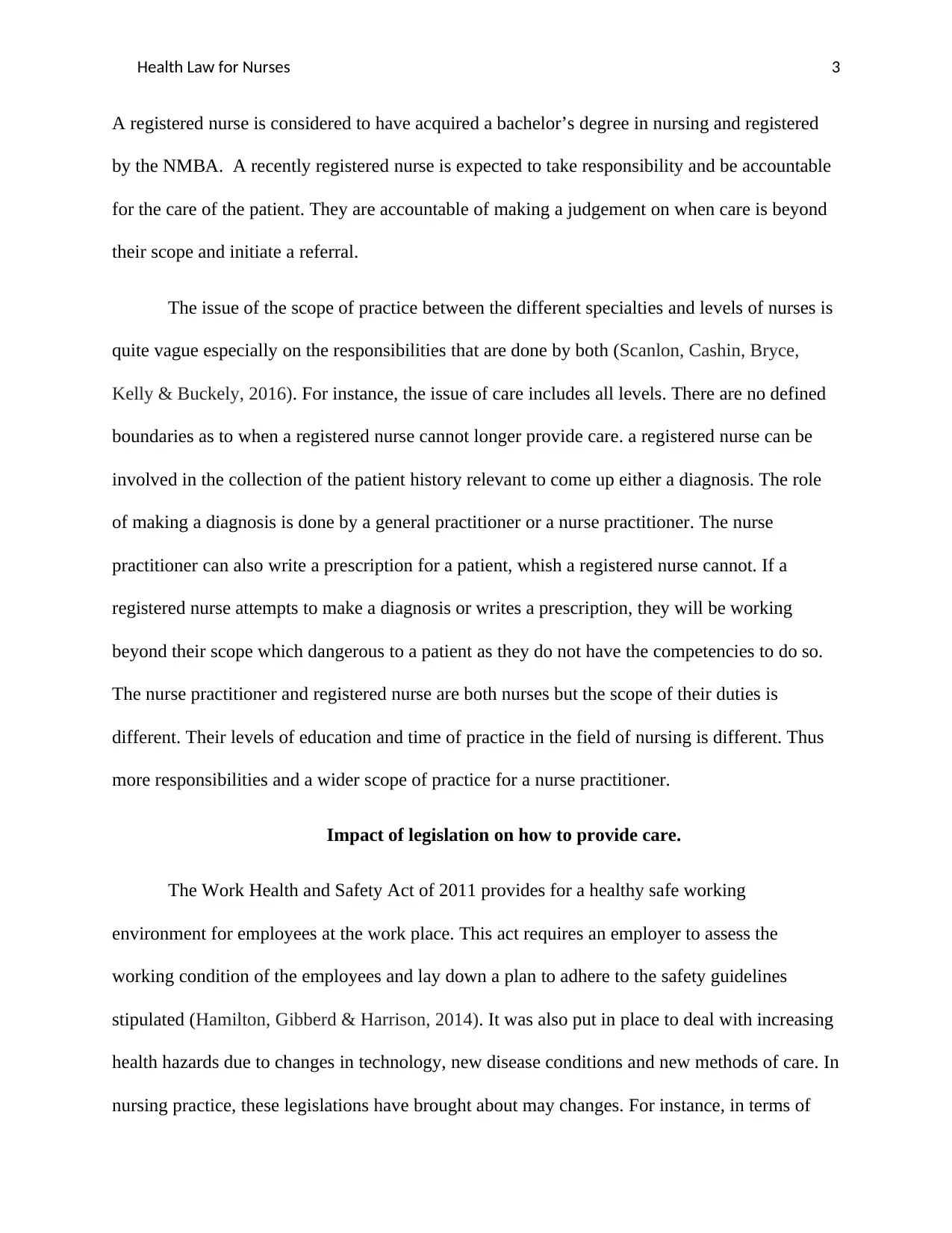
Health Law for Nurses 3
A registered nurse is considered to have acquired a bachelor’s degree in nursing and registered
by the NMBA. A recently registered nurse is expected to take responsibility and be accountable
for the care of the patient. They are accountable of making a judgement on when care is beyond
their scope and initiate a referral.
The issue of the scope of practice between the different specialties and levels of nurses is
quite vague especially on the responsibilities that are done by both (Scanlon, Cashin, Bryce,
Kelly & Buckely, 2016). For instance, the issue of care includes all levels. There are no defined
boundaries as to when a registered nurse cannot longer provide care. a registered nurse can be
involved in the collection of the patient history relevant to come up either a diagnosis. The role
of making a diagnosis is done by a general practitioner or a nurse practitioner. The nurse
practitioner can also write a prescription for a patient, whish a registered nurse cannot. If a
registered nurse attempts to make a diagnosis or writes a prescription, they will be working
beyond their scope which dangerous to a patient as they do not have the competencies to do so.
The nurse practitioner and registered nurse are both nurses but the scope of their duties is
different. Their levels of education and time of practice in the field of nursing is different. Thus
more responsibilities and a wider scope of practice for a nurse practitioner.
Impact of legislation on how to provide care.
The Work Health and Safety Act of 2011 provides for a healthy safe working
environment for employees at the work place. This act requires an employer to assess the
working condition of the employees and lay down a plan to adhere to the safety guidelines
stipulated (Hamilton, Gibberd & Harrison, 2014). It was also put in place to deal with increasing
health hazards due to changes in technology, new disease conditions and new methods of care. In
nursing practice, these legislations have brought about may changes. For instance, in terms of
A registered nurse is considered to have acquired a bachelor’s degree in nursing and registered
by the NMBA. A recently registered nurse is expected to take responsibility and be accountable
for the care of the patient. They are accountable of making a judgement on when care is beyond
their scope and initiate a referral.
The issue of the scope of practice between the different specialties and levels of nurses is
quite vague especially on the responsibilities that are done by both (Scanlon, Cashin, Bryce,
Kelly & Buckely, 2016). For instance, the issue of care includes all levels. There are no defined
boundaries as to when a registered nurse cannot longer provide care. a registered nurse can be
involved in the collection of the patient history relevant to come up either a diagnosis. The role
of making a diagnosis is done by a general practitioner or a nurse practitioner. The nurse
practitioner can also write a prescription for a patient, whish a registered nurse cannot. If a
registered nurse attempts to make a diagnosis or writes a prescription, they will be working
beyond their scope which dangerous to a patient as they do not have the competencies to do so.
The nurse practitioner and registered nurse are both nurses but the scope of their duties is
different. Their levels of education and time of practice in the field of nursing is different. Thus
more responsibilities and a wider scope of practice for a nurse practitioner.
Impact of legislation on how to provide care.
The Work Health and Safety Act of 2011 provides for a healthy safe working
environment for employees at the work place. This act requires an employer to assess the
working condition of the employees and lay down a plan to adhere to the safety guidelines
stipulated (Hamilton, Gibberd & Harrison, 2014). It was also put in place to deal with increasing
health hazards due to changes in technology, new disease conditions and new methods of care. In
nursing practice, these legislations have brought about may changes. For instance, in terms of
⊘ This is a preview!⊘
Do you want full access?
Subscribe today to unlock all pages.

Trusted by 1+ million students worldwide

Health Law for Nurses 4
technology, new machines and techniques have been introduced to assist in patient care. Nurses
have been trained to use them in the working places preventing accidents resulting from
insufficient education on how to handle them. use of protective clothing has been emphasized in
situations where the nurses’ health is at risk due to transmission or harmful substances such as
the chemicals used in chemotherapy. The act accords the duty of care to the employer and is
expected to exercise this responsibility with due diligence (Holt & Allen, 2015). The employee is
expected to take reasonable care for themselves and others. Nurses as employees have had to be
trained and retrained on occupational health and hazard in practice.
The Health Records and Information Privacy Act of 2002 no. 71, regulates the sharing of
information that is identifiable or potentially identifiable to the patient (Bennett & Raab, 2017).
It provides for a framework in law, within which patients information can be handled responsibly
and in a manner to protect their privacy (O'Keefe & Rubin, 2015). Health care workers,
including the nurses, have access to information that is identifiable to the patient. They are
mandated by law to exercise the highest level of confidentiality only with exemptions when it
may be justifiable to breach (White, McDonald & Willmott, 2014). An informed consent to
sharing of the information should be given by the patient if such information need to be
disclosed. Nurses have the obligation to ensure that they handle the information responsibly.
They have to seek consent before disclosing their patients’ personal information.
Nurses responsibility in unsafe or unprofessional practice.
Legal.
A Registered Health Practitioner is responsible for reporting a colleague whom they feel
has committed a notifiable conduct. According to Stewart, Psych and Hepner (2015), the Health
technology, new machines and techniques have been introduced to assist in patient care. Nurses
have been trained to use them in the working places preventing accidents resulting from
insufficient education on how to handle them. use of protective clothing has been emphasized in
situations where the nurses’ health is at risk due to transmission or harmful substances such as
the chemicals used in chemotherapy. The act accords the duty of care to the employer and is
expected to exercise this responsibility with due diligence (Holt & Allen, 2015). The employee is
expected to take reasonable care for themselves and others. Nurses as employees have had to be
trained and retrained on occupational health and hazard in practice.
The Health Records and Information Privacy Act of 2002 no. 71, regulates the sharing of
information that is identifiable or potentially identifiable to the patient (Bennett & Raab, 2017).
It provides for a framework in law, within which patients information can be handled responsibly
and in a manner to protect their privacy (O'Keefe & Rubin, 2015). Health care workers,
including the nurses, have access to information that is identifiable to the patient. They are
mandated by law to exercise the highest level of confidentiality only with exemptions when it
may be justifiable to breach (White, McDonald & Willmott, 2014). An informed consent to
sharing of the information should be given by the patient if such information need to be
disclosed. Nurses have the obligation to ensure that they handle the information responsibly.
They have to seek consent before disclosing their patients’ personal information.
Nurses responsibility in unsafe or unprofessional practice.
Legal.
A Registered Health Practitioner is responsible for reporting a colleague whom they feel
has committed a notifiable conduct. According to Stewart, Psych and Hepner (2015), the Health
Paraphrase This Document
Need a fresh take? Get an instant paraphrase of this document with our AI Paraphraser
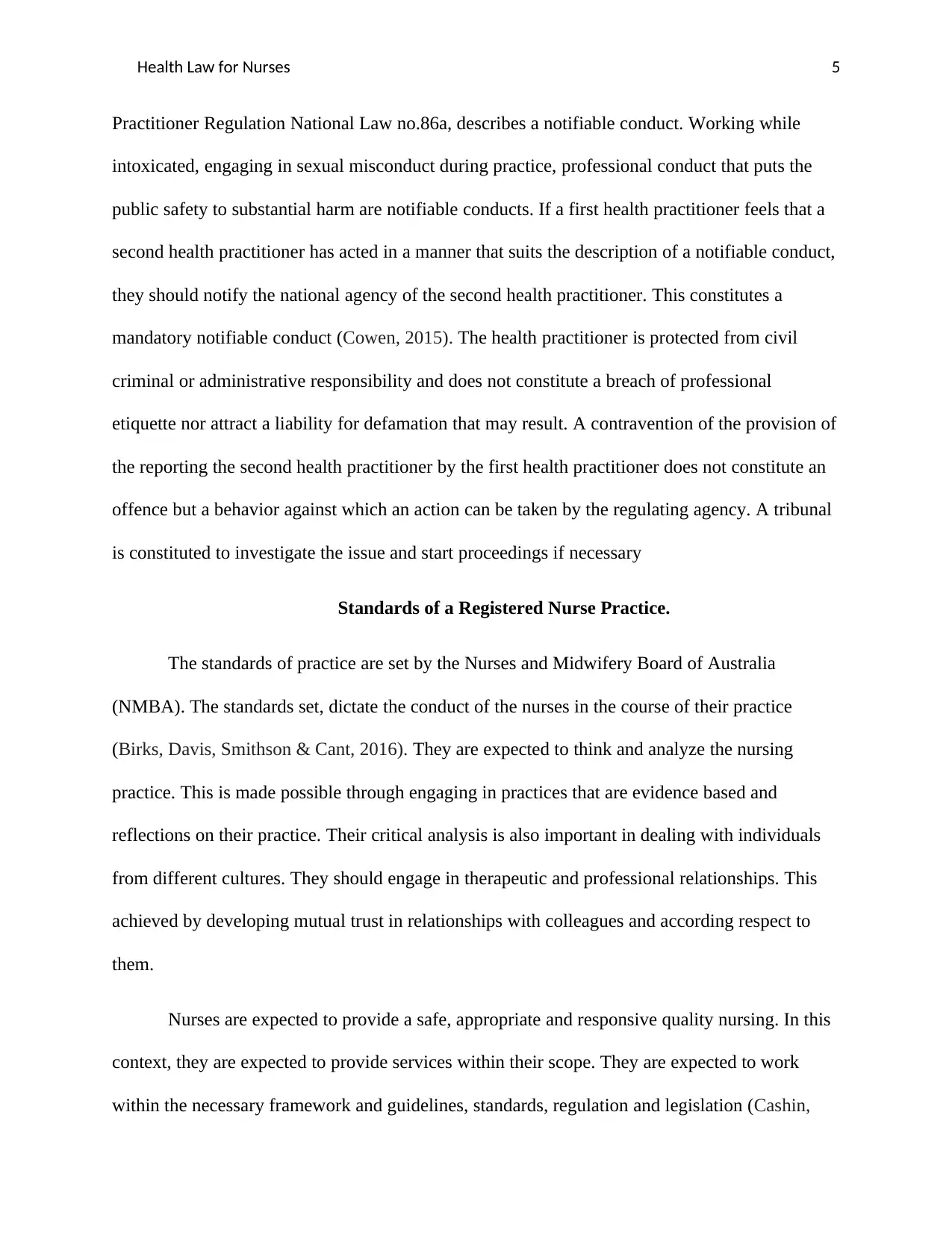
Health Law for Nurses 5
Practitioner Regulation National Law no.86a, describes a notifiable conduct. Working while
intoxicated, engaging in sexual misconduct during practice, professional conduct that puts the
public safety to substantial harm are notifiable conducts. If a first health practitioner feels that a
second health practitioner has acted in a manner that suits the description of a notifiable conduct,
they should notify the national agency of the second health practitioner. This constitutes a
mandatory notifiable conduct (Cowen, 2015). The health practitioner is protected from civil
criminal or administrative responsibility and does not constitute a breach of professional
etiquette nor attract a liability for defamation that may result. A contravention of the provision of
the reporting the second health practitioner by the first health practitioner does not constitute an
offence but a behavior against which an action can be taken by the regulating agency. A tribunal
is constituted to investigate the issue and start proceedings if necessary
Standards of a Registered Nurse Practice.
The standards of practice are set by the Nurses and Midwifery Board of Australia
(NMBA). The standards set, dictate the conduct of the nurses in the course of their practice
(Birks, Davis, Smithson & Cant, 2016). They are expected to think and analyze the nursing
practice. This is made possible through engaging in practices that are evidence based and
reflections on their practice. Their critical analysis is also important in dealing with individuals
from different cultures. They should engage in therapeutic and professional relationships. This
achieved by developing mutual trust in relationships with colleagues and according respect to
them.
Nurses are expected to provide a safe, appropriate and responsive quality nursing. In this
context, they are expected to provide services within their scope. They are expected to work
within the necessary framework and guidelines, standards, regulation and legislation (Cashin,
Practitioner Regulation National Law no.86a, describes a notifiable conduct. Working while
intoxicated, engaging in sexual misconduct during practice, professional conduct that puts the
public safety to substantial harm are notifiable conducts. If a first health practitioner feels that a
second health practitioner has acted in a manner that suits the description of a notifiable conduct,
they should notify the national agency of the second health practitioner. This constitutes a
mandatory notifiable conduct (Cowen, 2015). The health practitioner is protected from civil
criminal or administrative responsibility and does not constitute a breach of professional
etiquette nor attract a liability for defamation that may result. A contravention of the provision of
the reporting the second health practitioner by the first health practitioner does not constitute an
offence but a behavior against which an action can be taken by the regulating agency. A tribunal
is constituted to investigate the issue and start proceedings if necessary
Standards of a Registered Nurse Practice.
The standards of practice are set by the Nurses and Midwifery Board of Australia
(NMBA). The standards set, dictate the conduct of the nurses in the course of their practice
(Birks, Davis, Smithson & Cant, 2016). They are expected to think and analyze the nursing
practice. This is made possible through engaging in practices that are evidence based and
reflections on their practice. Their critical analysis is also important in dealing with individuals
from different cultures. They should engage in therapeutic and professional relationships. This
achieved by developing mutual trust in relationships with colleagues and according respect to
them.
Nurses are expected to provide a safe, appropriate and responsive quality nursing. In this
context, they are expected to provide services within their scope. They are expected to work
within the necessary framework and guidelines, standards, regulation and legislation (Cashin,
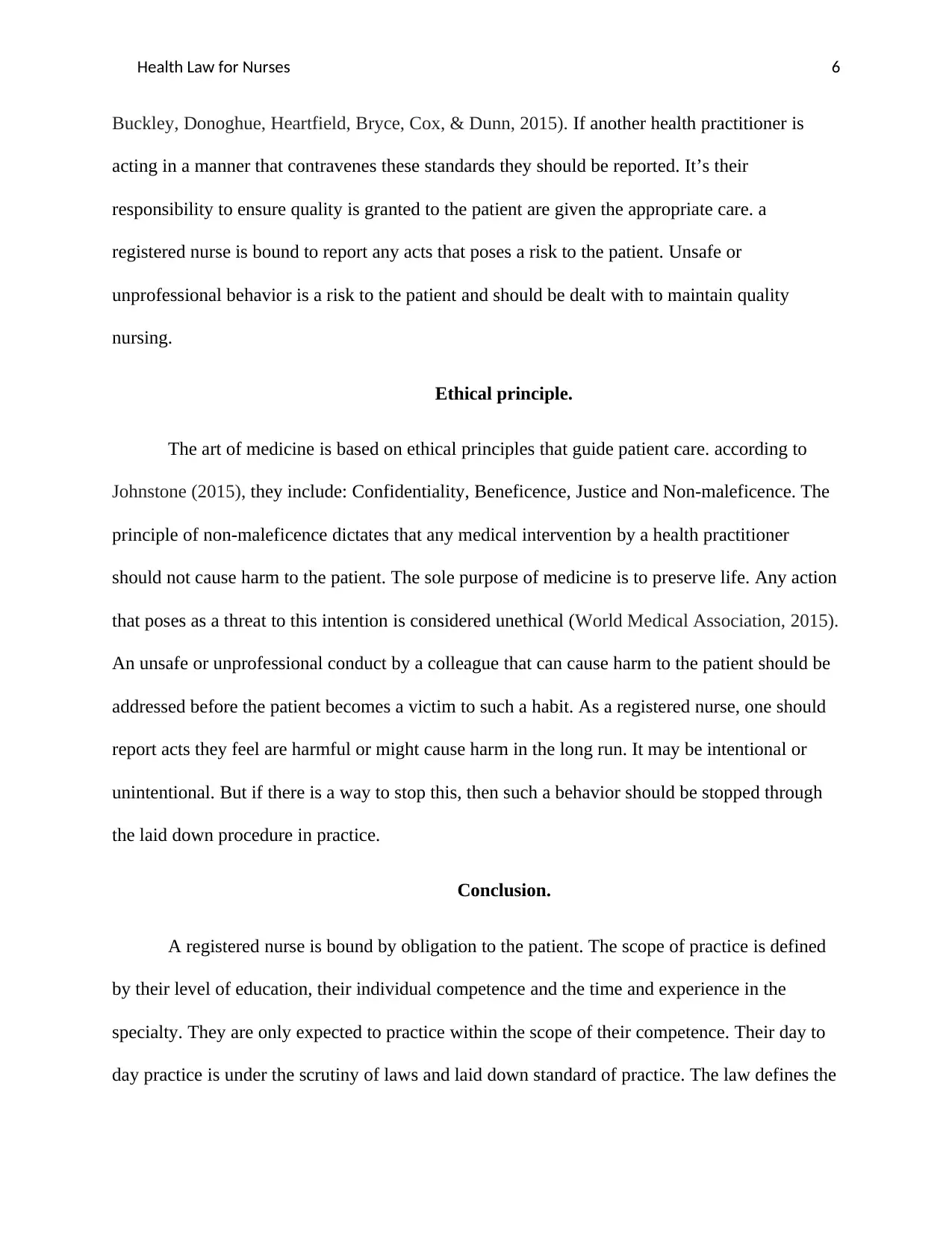
Health Law for Nurses 6
Buckley, Donoghue, Heartfield, Bryce, Cox, & Dunn, 2015). If another health practitioner is
acting in a manner that contravenes these standards they should be reported. It’s their
responsibility to ensure quality is granted to the patient are given the appropriate care. a
registered nurse is bound to report any acts that poses a risk to the patient. Unsafe or
unprofessional behavior is a risk to the patient and should be dealt with to maintain quality
nursing.
Ethical principle.
The art of medicine is based on ethical principles that guide patient care. according to
Johnstone (2015), they include: Confidentiality, Beneficence, Justice and Non-maleficence. The
principle of non-maleficence dictates that any medical intervention by a health practitioner
should not cause harm to the patient. The sole purpose of medicine is to preserve life. Any action
that poses as a threat to this intention is considered unethical (World Medical Association, 2015).
An unsafe or unprofessional conduct by a colleague that can cause harm to the patient should be
addressed before the patient becomes a victim to such a habit. As a registered nurse, one should
report acts they feel are harmful or might cause harm in the long run. It may be intentional or
unintentional. But if there is a way to stop this, then such a behavior should be stopped through
the laid down procedure in practice.
Conclusion.
A registered nurse is bound by obligation to the patient. The scope of practice is defined
by their level of education, their individual competence and the time and experience in the
specialty. They are only expected to practice within the scope of their competence. Their day to
day practice is under the scrutiny of laws and laid down standard of practice. The law defines the
Buckley, Donoghue, Heartfield, Bryce, Cox, & Dunn, 2015). If another health practitioner is
acting in a manner that contravenes these standards they should be reported. It’s their
responsibility to ensure quality is granted to the patient are given the appropriate care. a
registered nurse is bound to report any acts that poses a risk to the patient. Unsafe or
unprofessional behavior is a risk to the patient and should be dealt with to maintain quality
nursing.
Ethical principle.
The art of medicine is based on ethical principles that guide patient care. according to
Johnstone (2015), they include: Confidentiality, Beneficence, Justice and Non-maleficence. The
principle of non-maleficence dictates that any medical intervention by a health practitioner
should not cause harm to the patient. The sole purpose of medicine is to preserve life. Any action
that poses as a threat to this intention is considered unethical (World Medical Association, 2015).
An unsafe or unprofessional conduct by a colleague that can cause harm to the patient should be
addressed before the patient becomes a victim to such a habit. As a registered nurse, one should
report acts they feel are harmful or might cause harm in the long run. It may be intentional or
unintentional. But if there is a way to stop this, then such a behavior should be stopped through
the laid down procedure in practice.
Conclusion.
A registered nurse is bound by obligation to the patient. The scope of practice is defined
by their level of education, their individual competence and the time and experience in the
specialty. They are only expected to practice within the scope of their competence. Their day to
day practice is under the scrutiny of laws and laid down standard of practice. The law defines the
⊘ This is a preview!⊘
Do you want full access?
Subscribe today to unlock all pages.

Trusted by 1+ million students worldwide
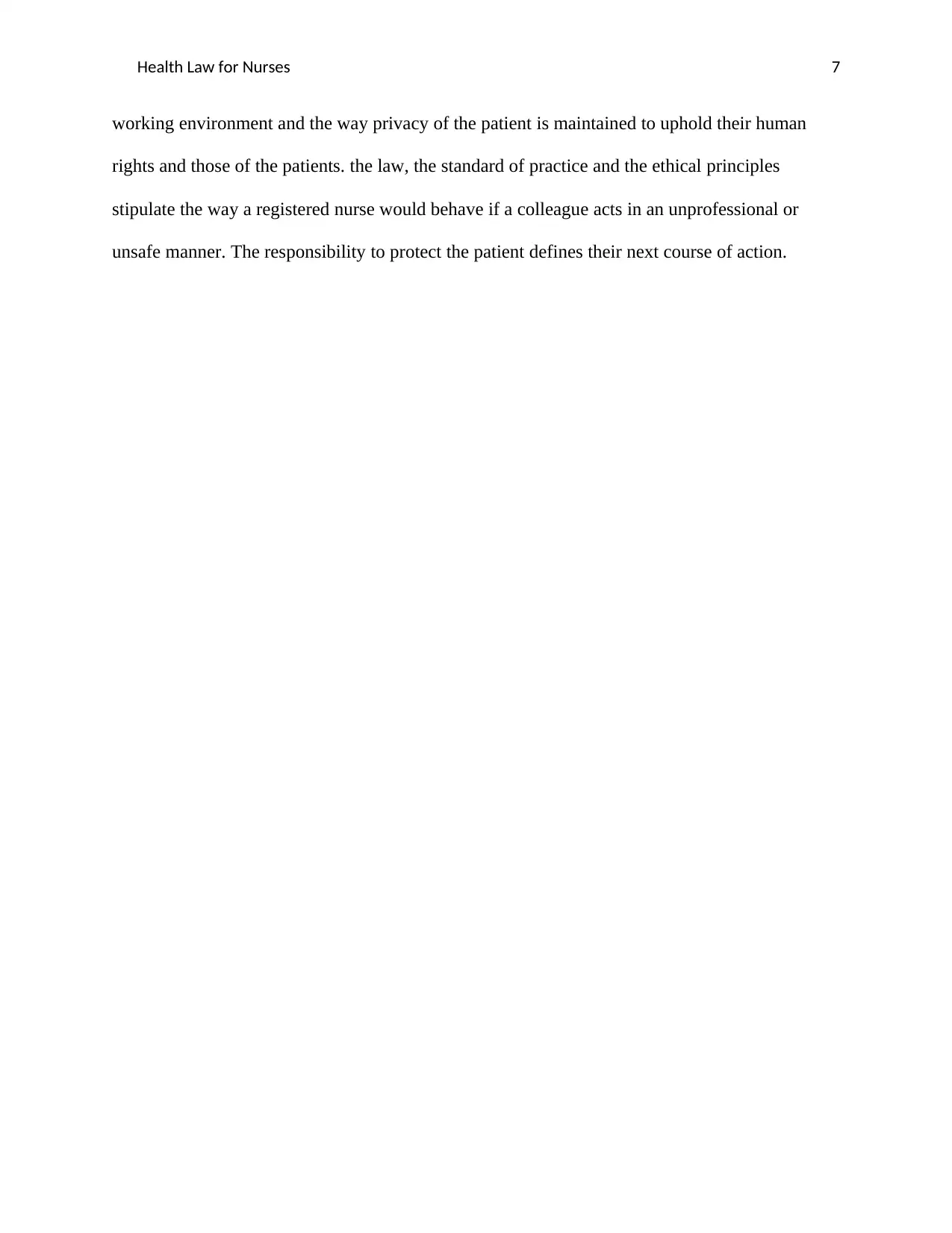
Health Law for Nurses 7
working environment and the way privacy of the patient is maintained to uphold their human
rights and those of the patients. the law, the standard of practice and the ethical principles
stipulate the way a registered nurse would behave if a colleague acts in an unprofessional or
unsafe manner. The responsibility to protect the patient defines their next course of action.
working environment and the way privacy of the patient is maintained to uphold their human
rights and those of the patients. the law, the standard of practice and the ethical principles
stipulate the way a registered nurse would behave if a colleague acts in an unprofessional or
unsafe manner. The responsibility to protect the patient defines their next course of action.
Paraphrase This Document
Need a fresh take? Get an instant paraphrase of this document with our AI Paraphraser
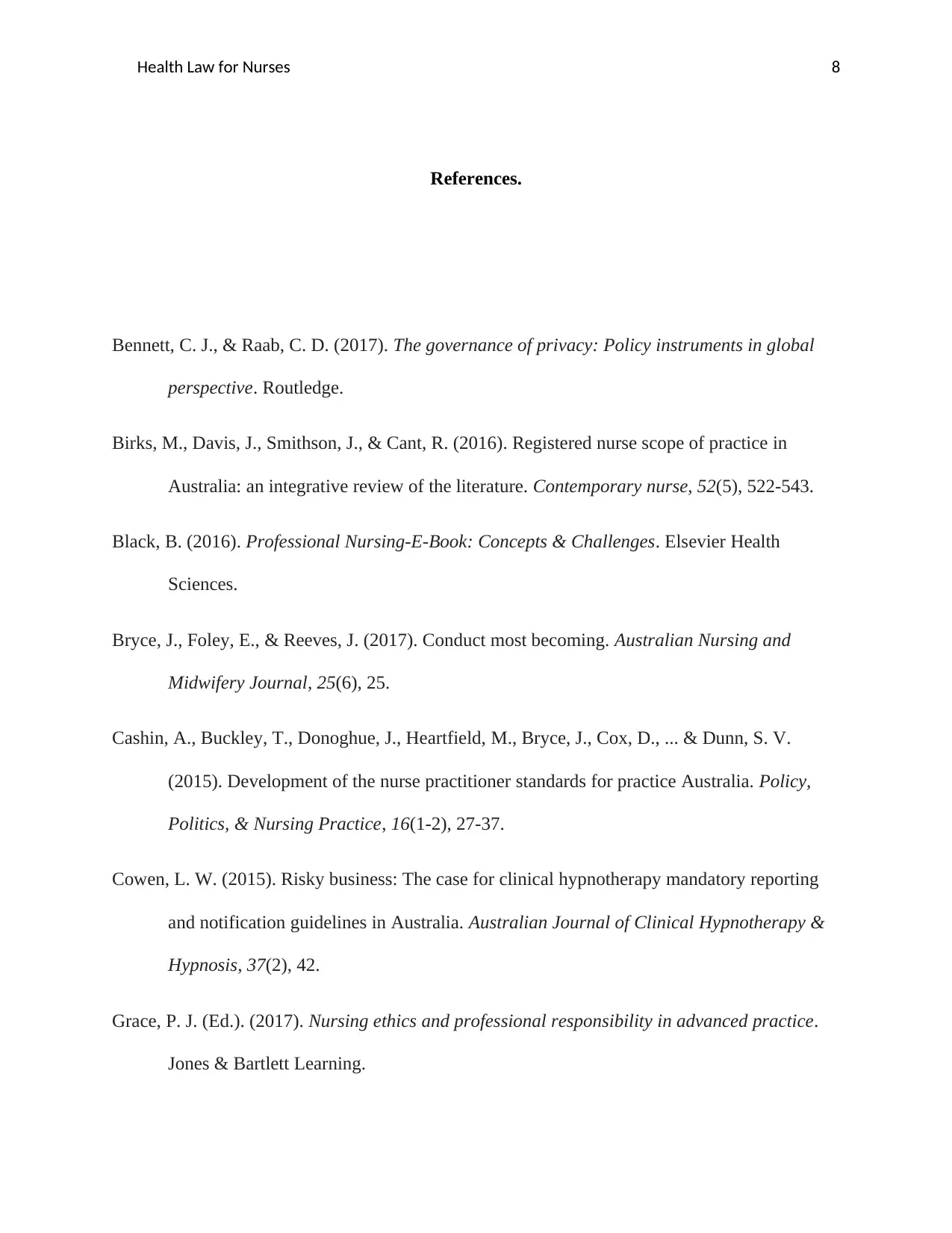
Health Law for Nurses 8
References.
Bennett, C. J., & Raab, C. D. (2017). The governance of privacy: Policy instruments in global
perspective. Routledge.
Birks, M., Davis, J., Smithson, J., & Cant, R. (2016). Registered nurse scope of practice in
Australia: an integrative review of the literature. Contemporary nurse, 52(5), 522-543.
Black, B. (2016). Professional Nursing-E-Book: Concepts & Challenges. Elsevier Health
Sciences.
Bryce, J., Foley, E., & Reeves, J. (2017). Conduct most becoming. Australian Nursing and
Midwifery Journal, 25(6), 25.
Cashin, A., Buckley, T., Donoghue, J., Heartfield, M., Bryce, J., Cox, D., ... & Dunn, S. V.
(2015). Development of the nurse practitioner standards for practice Australia. Policy,
Politics, & Nursing Practice, 16(1-2), 27-37.
Cowen, L. W. (2015). Risky business: The case for clinical hypnotherapy mandatory reporting
and notification guidelines in Australia. Australian Journal of Clinical Hypnotherapy &
Hypnosis, 37(2), 42.
Grace, P. J. (Ed.). (2017). Nursing ethics and professional responsibility in advanced practice.
Jones & Bartlett Learning.
References.
Bennett, C. J., & Raab, C. D. (2017). The governance of privacy: Policy instruments in global
perspective. Routledge.
Birks, M., Davis, J., Smithson, J., & Cant, R. (2016). Registered nurse scope of practice in
Australia: an integrative review of the literature. Contemporary nurse, 52(5), 522-543.
Black, B. (2016). Professional Nursing-E-Book: Concepts & Challenges. Elsevier Health
Sciences.
Bryce, J., Foley, E., & Reeves, J. (2017). Conduct most becoming. Australian Nursing and
Midwifery Journal, 25(6), 25.
Cashin, A., Buckley, T., Donoghue, J., Heartfield, M., Bryce, J., Cox, D., ... & Dunn, S. V.
(2015). Development of the nurse practitioner standards for practice Australia. Policy,
Politics, & Nursing Practice, 16(1-2), 27-37.
Cowen, L. W. (2015). Risky business: The case for clinical hypnotherapy mandatory reporting
and notification guidelines in Australia. Australian Journal of Clinical Hypnotherapy &
Hypnosis, 37(2), 42.
Grace, P. J. (Ed.). (2017). Nursing ethics and professional responsibility in advanced practice.
Jones & Bartlett Learning.
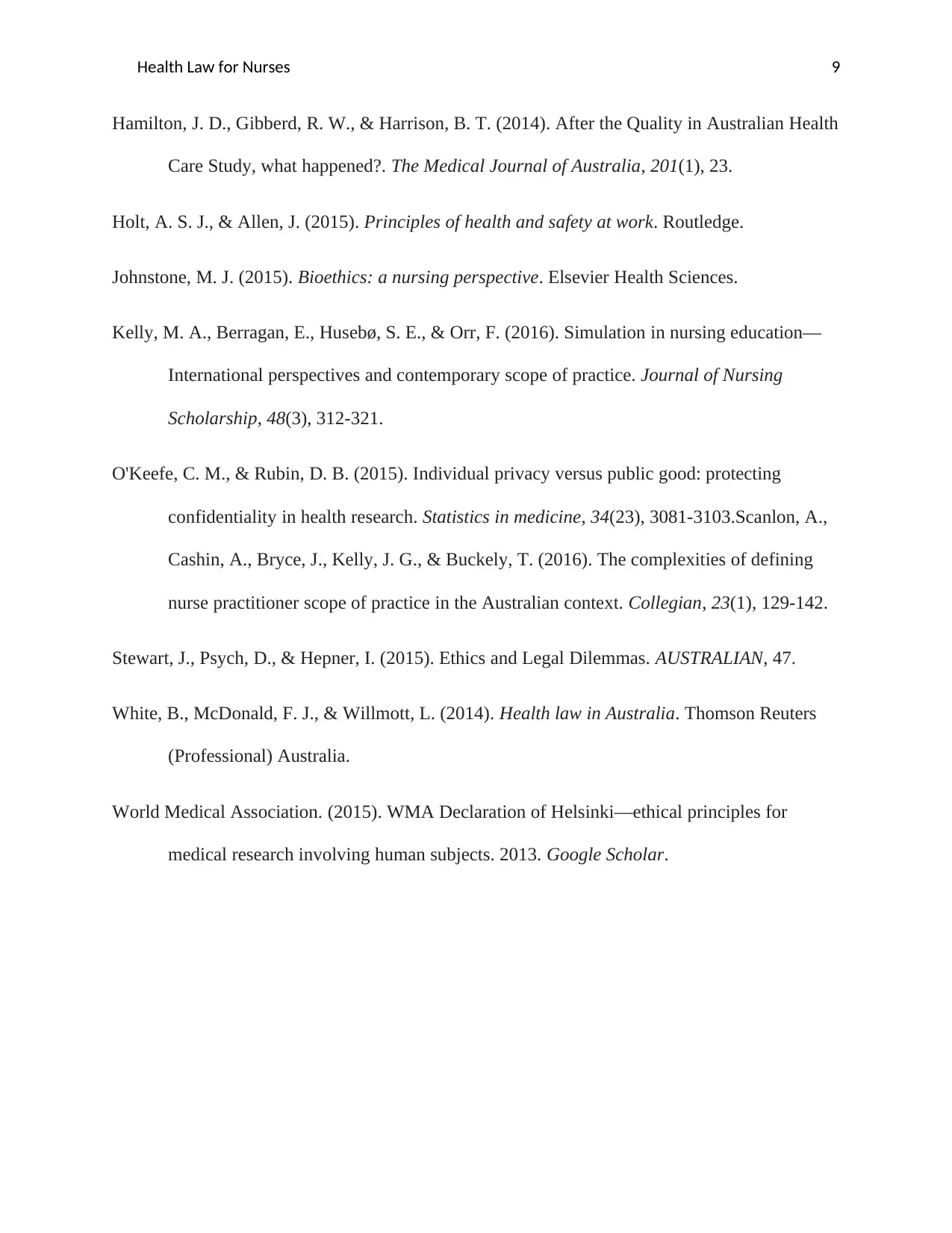
Health Law for Nurses 9
Hamilton, J. D., Gibberd, R. W., & Harrison, B. T. (2014). After the Quality in Australian Health
Care Study, what happened?. The Medical Journal of Australia, 201(1), 23.
Holt, A. S. J., & Allen, J. (2015). Principles of health and safety at work. Routledge.
Johnstone, M. J. (2015). Bioethics: a nursing perspective. Elsevier Health Sciences.
Kelly, M. A., Berragan, E., Husebø, S. E., & Orr, F. (2016). Simulation in nursing education—
International perspectives and contemporary scope of practice. Journal of Nursing
Scholarship, 48(3), 312-321.
O'Keefe, C. M., & Rubin, D. B. (2015). Individual privacy versus public good: protecting
confidentiality in health research. Statistics in medicine, 34(23), 3081-3103.Scanlon, A.,
Cashin, A., Bryce, J., Kelly, J. G., & Buckely, T. (2016). The complexities of defining
nurse practitioner scope of practice in the Australian context. Collegian, 23(1), 129-142.
Stewart, J., Psych, D., & Hepner, I. (2015). Ethics and Legal Dilemmas. AUSTRALIAN, 47.
White, B., McDonald, F. J., & Willmott, L. (2014). Health law in Australia. Thomson Reuters
(Professional) Australia.
World Medical Association. (2015). WMA Declaration of Helsinki—ethical principles for
medical research involving human subjects. 2013. Google Scholar.
Hamilton, J. D., Gibberd, R. W., & Harrison, B. T. (2014). After the Quality in Australian Health
Care Study, what happened?. The Medical Journal of Australia, 201(1), 23.
Holt, A. S. J., & Allen, J. (2015). Principles of health and safety at work. Routledge.
Johnstone, M. J. (2015). Bioethics: a nursing perspective. Elsevier Health Sciences.
Kelly, M. A., Berragan, E., Husebø, S. E., & Orr, F. (2016). Simulation in nursing education—
International perspectives and contemporary scope of practice. Journal of Nursing
Scholarship, 48(3), 312-321.
O'Keefe, C. M., & Rubin, D. B. (2015). Individual privacy versus public good: protecting
confidentiality in health research. Statistics in medicine, 34(23), 3081-3103.Scanlon, A.,
Cashin, A., Bryce, J., Kelly, J. G., & Buckely, T. (2016). The complexities of defining
nurse practitioner scope of practice in the Australian context. Collegian, 23(1), 129-142.
Stewart, J., Psych, D., & Hepner, I. (2015). Ethics and Legal Dilemmas. AUSTRALIAN, 47.
White, B., McDonald, F. J., & Willmott, L. (2014). Health law in Australia. Thomson Reuters
(Professional) Australia.
World Medical Association. (2015). WMA Declaration of Helsinki—ethical principles for
medical research involving human subjects. 2013. Google Scholar.
⊘ This is a preview!⊘
Do you want full access?
Subscribe today to unlock all pages.

Trusted by 1+ million students worldwide
1 out of 9
Related Documents
Your All-in-One AI-Powered Toolkit for Academic Success.
+13062052269
info@desklib.com
Available 24*7 on WhatsApp / Email
![[object Object]](/_next/static/media/star-bottom.7253800d.svg)
Unlock your academic potential
Copyright © 2020–2026 A2Z Services. All Rights Reserved. Developed and managed by ZUCOL.





